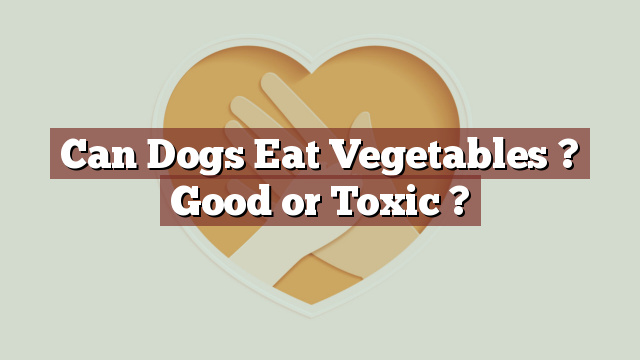Can Dogs Eat Vegetables? Good or Toxic?
Knowing which foods are safe for your dog to eat is crucial in maintaining their overall health and well-being. Can dogs eat vegetables? Let’s explore the safety and nutritional value of vegetables for our furry friends.
Nutritional Value of Vegetables for Dogs: What You Need to Know
Vegetables offer a wide range of essential nutrients that can be beneficial for dogs. They are often rich in vitamins, minerals, and fiber, which contribute to a healthy diet. Some common vegetables that dogs can safely consume include carrots, peas, green beans, and sweet potatoes.
Carrots, for example, are packed with vitamin A, which aids in maintaining good vision and a strong immune system. Peas and green beans are excellent sources of fiber and help regulate digestion. Sweet potatoes provide dogs with vitamin C, potassium, and other important nutrients.
Can Dogs Eat Vegetables? Exploring Safety and Toxicity
The answer to the question "can dogs eat vegetables?" is a resounding yes. However, it is crucial to identify which vegetables are safe for your dog and which ones should be avoided. While many vegetables are safe and beneficial, some can be harmful or toxic to dogs.
Certain vegetables, such as onions, garlic, and chives, contain compounds that can damage a dog’s red blood cells, leading to anemia. Additionally, vegetables from the nightshade family, like tomatoes and potatoes, contain solanine, which can be toxic to dogs if consumed in large quantities.
Potential Risks and Benefits of Feeding Dogs Vegetables
Feeding your dog vegetables can have numerous benefits. As mentioned earlier, vegetables provide essential nutrients that contribute to their overall health. They can aid in digestion, promote a healthy weight, and even improve skin and coat condition.
However, it’s important to recognize the potential risks associated with feeding dogs vegetables. Some dogs may have difficulty digesting certain vegetables, which could lead to gastrointestinal upset or even diarrhea. Additionally, if a dog consumes toxic vegetables such as onions or tomatoes in large amounts, it can have severe health consequences.
My Dog Ate Vegetables, Now What? Steps to Take and Watch For
If your dog accidentally consumes vegetables that are potentially harmful or toxic, it is important to take immediate action. Consulting with a veterinarian is crucial in determining the severity of the situation and receiving proper guidance. They will be able to evaluate your dog’s symptoms, conduct any necessary tests, and provide appropriate treatment.
When monitoring your dog after they have eaten vegetables, look out for signs of gastrointestinal distress, such as vomiting or diarrhea. Other symptoms, such as lethargy, weakness, or difficulty breathing, may indicate a more serious reaction and should be addressed by a professional immediately.
Canine Diet: Balancing Vegetables for Optimal Health
While vegetables can be a valuable addition to your dog’s diet, they should never replace their primary source of nutrition, which is high-quality dog food. It is important to strike a balance and incorporate vegetables as a supplement to their regular meals.
When introducing vegetables to your dog’s diet, start with small amounts and gradually increase the portion size. Monitor their response and adjust accordingly. Additionally, ensure that the vegetables are properly cooked or prepared to enhance digestibility and avoid any potential health risks.
In conclusion, dogs can safely consume many types of vegetables, which provide valuable nutrients and health benefits. However, it is essential to be aware of which vegetables are safe and which ones should be avoided. When in doubt, always consult your veterinarian to ensure the well-being of your furry companion.
Thank you for investing your time in exploring [page_title] on Can-Eat.org. Our goal is to provide readers like you with thorough and reliable information about various dietary topics. Each article, including [page_title], stems from diligent research and a passion for understanding the nuances of our food choices. We believe that knowledge is a vital step towards making informed and healthy decisions. However, while "[page_title]" sheds light on its specific topic, it's crucial to remember that everyone's body reacts differently to foods and dietary changes. What might be beneficial for one person could have different effects on another. Before you consider integrating suggestions or insights from "[page_title]" into your diet, it's always wise to consult with a nutritionist or healthcare professional. Their specialized knowledge ensures that you're making choices best suited to your individual health needs. As you navigate [page_title], be mindful of potential allergies, intolerances, or unique dietary requirements you may have. No singular article can capture the vast diversity of human health, and individualized guidance is invaluable. The content provided in [page_title] serves as a general guide. It is not, by any means, a substitute for personalized medical or nutritional advice. Your health should always be the top priority, and professional guidance is the best path forward. In your journey towards a balanced and nutritious lifestyle, we hope that [page_title] serves as a helpful stepping stone. Remember, informed decisions lead to healthier outcomes. Thank you for trusting Can-Eat.org. Continue exploring, learning, and prioritizing your health. Cheers to a well-informed and healthier future!

